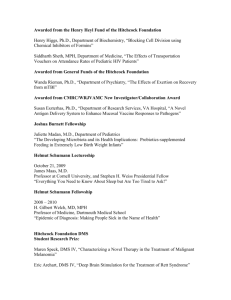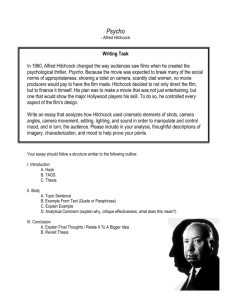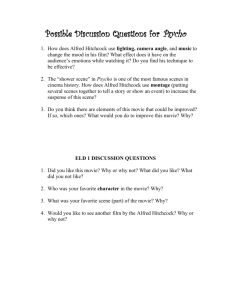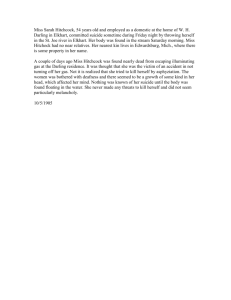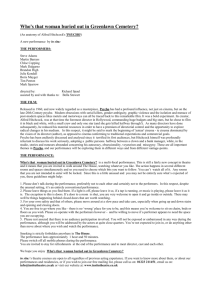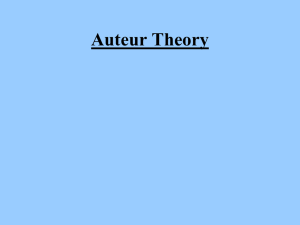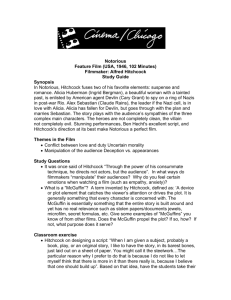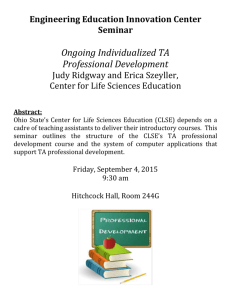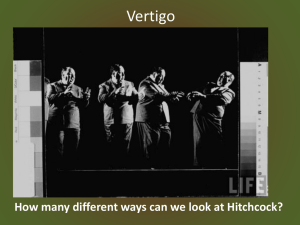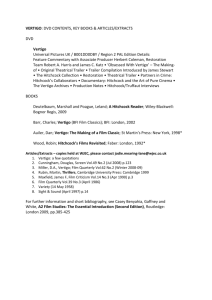DIRECTORS/ALFRED HITCHCOCK COURSE CODE: FM
advertisement
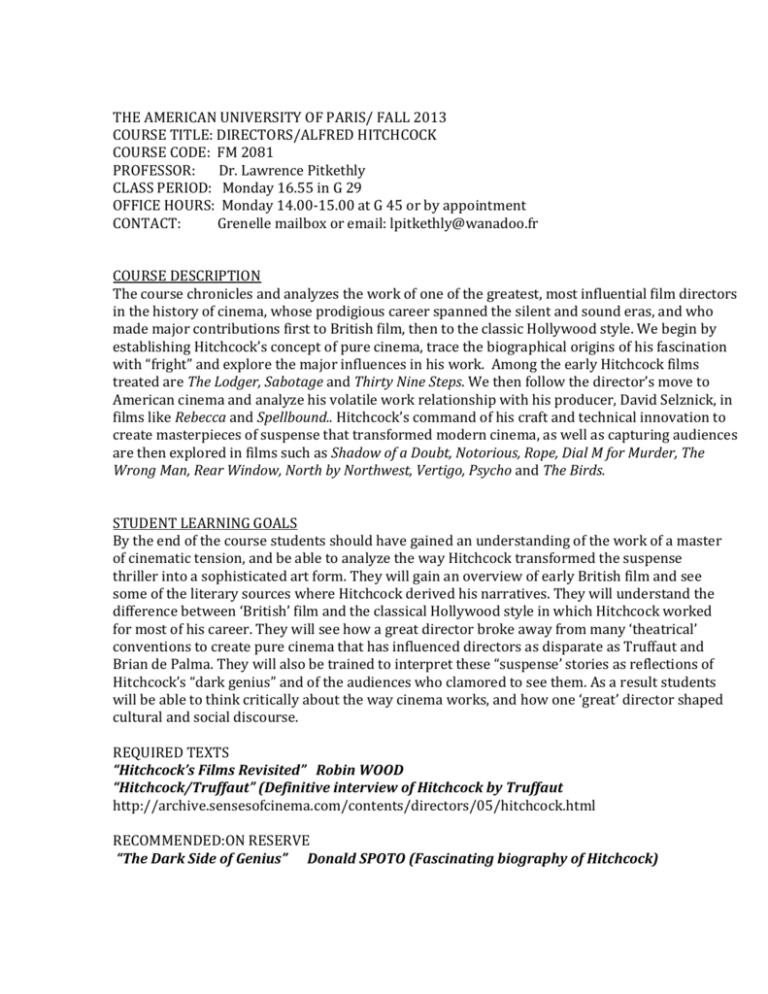
THE AMERICAN UNIVERSITY OF PARIS/ FALL 2013 COURSE TITLE: DIRECTORS/ALFRED HITCHCOCK COURSE CODE: FM 2081 PROFESSOR: Dr. Lawrence Pitkethly CLASS PERIOD: Monday 16.55 in G 29 OFFICE HOURS: Monday 14.00-15.00 at G 45 or by appointment CONTACT: Grenelle mailbox or email: lpitkethly@wanadoo.fr COURSE DESCRIPTION The course chronicles and analyzes the work of one of the greatest, most influential film directors in the history of cinema, whose prodigious career spanned the silent and sound eras, and who made major contributions first to British film, then to the classic Hollywood style. We begin by establishing Hitchcock’s concept of pure cinema, trace the biographical origins of his fascination with “fright” and explore the major influences in his work. Among the early Hitchcock films treated are The Lodger, Sabotage and Thirty Nine Steps. We then follow the director’s move to American cinema and analyze his volatile work relationship with his producer, David Selznick, in films like Rebecca and Spellbound.. Hitchcock’s command of his craft and technical innovation to create masterpieces of suspense that transformed modern cinema, as well as capturing audiences are then explored in films such as Shadow of a Doubt, Notorious, Rope, Dial M for Murder, The Wrong Man, Rear Window, North by Northwest, Vertigo, Psycho and The Birds. STUDENT LEARNING GOALS By the end of the course students should have gained an understanding of the work of a master of cinematic tension, and be able to analyze the way Hitchcock transformed the suspense thriller into a sophisticated art form. They will gain an overview of early British film and see some of the literary sources where Hitchcock derived his narratives. They will understand the difference between ‘British’ film and the classical Hollywood style in which Hitchcock worked for most of his career. They will see how a great director broke away from many ‘theatrical’ conventions to create pure cinema that has influenced directors as disparate as Truffaut and Brian de Palma. They will also be trained to interpret these “suspense’ stories as reflections of Hitchcock’s “dark genius” and of the audiences who clamored to see them. As a result students will be able to think critically about the way cinema works, and how one ‘great’ director shaped cultural and social discourse. REQUIRED TEXTS “Hitchcock’s Films Revisited” Robin WOOD “Hitchcock/Truffaut” (Definitive interview of Hitchcock by Truffaut http://archive.sensesofcinema.com/contents/directors/05/hitchcock.html RECOMMENDED:ON RESERVE “The Dark Side of Genius” Donald SPOTO (Fascinating biography of Hitchcock) EVALUATION Attendance at class is obligatory, except for medical or other emergency reasons for which an administrative note is required. Attendance and participation in class accounts for 20% of the student’s class grade. Class presentations count for 10%. Each student must write two papers, each of which counts for 25% of the class grade. The final exam counts for 20%. ATTENDANCE POLICY: Students studying at The American University of Paris are expected to attend ALL scheduled classes. A maximum of four (4) excused absences per semester may be requested for all 4-credit courses. Two (2) excused absences per semester per 1-credit course may be requested. The French Department has its own attendance policy. Students are responsible for compliance. Attendance at all exams is mandatory. Student Affairs will recommend that a professor excuse an absence for the following reason only: involuntary absences due to illness or personal emergencies, upon presentation of documentary proof of illness or emergency. Religious and National Holidays: Due to the large number of nationalities and faiths represented at the University, religious and national holidays (other than those on the academic schedule) will not be excused by Student Affairs. Academic Affairs will excuse an absence for students’ participation in study trips related to their courses. Lateness to course meetings: If a student arrives at course meetings more than 10 minutes late without documentation for one of the above scenarios, it will be considered an unexcused absence. All documentation must be submitted to the Office of Student Affairs within ONE WEEK following the first day of the absence. IN ALL CASES OF MISSED COURSE MEETINGS, THE RESPONSIBILITY FOR COMMUNICATION WITH THE PROFESSOR AND FOR ARRANGING TO MAKE UP MISSED WORK RESTS SOLELY WITH THE STUDENT. Whether an absence (excused or unexcused) is accepted or not is ALWAYS up to the discretion of the professor or the department. Unexcused absences can result in a low or failing participation grade. In the case of excessive excused and unexcused absences, it is up to the professor or the department to decide if the student will receive an “F” for the course. An instructor may recommend the withdrawal of a student whose absences from any course, excused or not, have made it impossible to continue in the course at a satisfactory level. The professor may consult with Student Affairs for additional information. Students must be mindful of this policy when making their travel arrangements, and especially during the Drop/Add and Exam Periods. ENGLISH LANGUAGE PROFICIENCY STATEMENT: As an Anglophone University, The American University of Paris is strongly committed to effective English language mastery at the undergraduate level. Most courses require scholarly research and formal written and oral presentations in English, and AUP students are expected to strive to achieve excellence in these domains as part of their course work. To that end, professors include English proficiency among the criteria in student evaluation, often referring students to the university Writing Lab where they may obtain help on specific academic assignments. Proficiency in English is monitored at various points throughout the student's academic career, most notably during the admissions and advising processes, while the student is completing general education requirements, and during the accomplishment of degree program courses and senior theses. CLASSES CLASS 1: Monday 9 September THE HITCHCOCK STYLE /PURE CINEMA Screening of interview with Hitchcock (1964), and of excerpts from SABOTAGE (1936) and PSYCHO (1960) PURE CINEMA Reading: Wood pp 55-85 Hitchcock/Truffaut pp11-20 pp 105-125 Screening of interviews with Hitchcock and excerpts from NORTH BY NORTHWEST (1959) CLASS 2: Monday 16 September EARLY INFLUENCES (Wilde, Poe, Murnau/German Expressionism) and BRITISH PERIOD Screening of excerpts - THE LAST LAUGH (Murnau, 1924) THE LODGER (Hitchcock, 1927) Reading: Hitchcock/Truffaut pp 24-61 Spoto (on reserve) pp 38-42 pp 66-74 pp 81-95 BRITISH PERIOD Reading: Wood: pp 239-287 Hitchcock/Truffaut pp 63-103 Spoto pp 144-151 Screening of excerpts from THE THIRTY NINE STEPS (1935) CLASS 3: Monday 23 September CROSSING TO AMERICA Reading: Hitchcock/Truffaut pp 133-143 Screening of excerpts from FOREIGN CORRESPONDENT (1940) CLASS PRESENTATIONS CLASS 4: Monday 30 September THE STRUGGLE WITH SELZNICK Reading: Hitchcock/Truffaut pp 125-133 Wood pp 231-232 Spoto pp 208-221 Screening of excerpts from REBECCA (1940) Reading: Hitchcock/Truffaut pp 163-167 Screening of excerpts from SPELLBOUND (1945) CLASS 5: Monday 7 October NOIR AND THE DARK SIDE OF AMERICAN FAMILY DRAMA Reading: Hitchcock/Truffaut pp 151-155 Wood pp 288-302 Spoto pp256-263 Screening of excerpts from SHADOW OF A DOUBT (1943) Reading: Wood pp 86-99 Hitchcock/Truffaut pp 193-199 Screening of excerpts from STRANGERS ON A TRAIN (1951) CLASS 6: Monday 14 October MASTERY OF CRAFT Reading: Hitchcock/Truffaut pp 167-173 Wood pp 303-335 Screening of excerpts from NOTORIOUS (1946) Reading: Hitchcock/Truffaut pp 177-184 Wood pp 78-80 Screening of excerpts from ROPE (1948) FIRST RESEARCH PAPER DUE 21 OCTOBER CLASS 7: Monday 21 October THEATER AND FILM Reading: Hitchcock/Truffaut pp 209-213 Screening of excerpts from DIAL M FOR MURDER (1953) CLASS 8: Monday 28 October REAR WINDOW Reading: Hitchcock/Truffaut pp 213-223 Wood pp 100-107 and pp 377-379 Screening of excerpts from REAR WINDOW (1954) CLASS 9: Monday 4 November VERTIGO Reading: Wood pp108-130 Hitchcock/Truffaut pp 243-248 Screening of excerpts from VERTIGO (1958) NO CLASS MONDAY 11 NOVEMBER CLASS 1O Monday 18 November MISTAKEN IDENTITIES Reading Hitchcock/Truffaut pp 235-243 Screening of excerpts from THE WRONG MAN (1956) Reading: Hitchcock/Truffaut pp 227-233 Screening of excerpts from THE MAN WHO KNEW TOO MUCH (1956) CLASS 11: Monday 25 November NORTH BY NORTHWEST Reading: Wood pp 131-141 Hitchcock/Truffaut pp 249-257 Screening of excerpts from NORTH BY NORTHWEST (1959) CLASS PRESENTATIONS CLASS 12: Monday 2 December THE BIRDS Reading: Wood pp 152-172 Hitchcock/Truffaut pp 284-299 Screening of excerpts from THE BIRDS (1963) CLASS PRESENTATIONS CLASS 13: Monday 9 December MARNIE Reading Hitchcock/Truffaut pp 300-320 Wood pp173-197 Screening of excerpts from MARNIE (1964) Reading: Hitchcock/Truffaut pp 259-283 Wood 288-301 http://archive.sensesofcinema.com/contents/00/6/modernity.html CLASS PRESENTATIONS SECOND RESEARCH PAPER DUE 9th DECEMBER FINAL EXAM TBA
